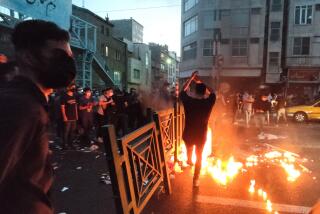The Lebed Factor in a Turbulent Nation
- Share via
Americans see politics as a game between individuals rather than a struggle over issues. We focus attention on daily tracking polls, not on what President Clinton might do in a second term. As for Russia, we concentrate on President Boris Yeltsin’s health reports and the personalities of those involved in the naked struggle for power to succeed him.
Issues, however, are important in Russia, which has just gone through a great revolution and does not follow the ways of American politics. Yeltsin was reelected in June despite a depression worse than America’s in 1932 and despite, according to our survey data, only 38% of Russians approving of his activity as president, while 52% disapproved. On virtually every policy issue, Russians were closer to the Communist position than Yeltsin’s. By 61% to 21%, they thought that the West, through its economic advice, was trying to weaken Russia.
Russians treated the 1996 election as a referendum on the anti-Communist revolution, not on Yeltsin’s policies. The Communist candidate, Gennady A. Zyuganov, tried to persuade voters that he had become a social democrat and would not repudiate the revolution. He was supported by the 20% of Russians who would like to go back to Communist rule, but only one-quarter of the others. Even if they did not like Yeltsin and his policies, these latter voters did not trust Zyuganov’s words.
In this situation, former Gen. Alexander I. Lebed has enormous political strength. He is not suspected of corruption and wins the character issue easily. He is decisive and daring and gives the impression that he would provide strong leadership to turn the country around. More important, like President Clinton, he has learned how to “triangulate”--how to move to the center without losing his base.
Lebed, discharged by Yeltsin last week from his post as security chief, is only 46 and is clearly “post-revolutionary.” He denounces the Communists and fully embraces market reforms. Yet he is highly critical of Yeltsin’s economic reform. More important, he does not do so abstractly, but in the name of another model of market reform, that of the Pacific Rim.
Lebed wants a strong state role in investment, high tariff walls and an export strategy; he has allied himself with a former minister of foreign economic relations, Sergei Glazyev, who can carry out these reforms. Naturally, he also favors what he calls the “semidemocracy” of the Asian model.
Lebed’s position on Chechnya is also subtle. Only one-third of Russians in our June poll wanted Chechen independence, and Lebed would not offer it--only an end of the fighting and a postponement of the independence issue for five years. His policy toward the republics of the former Soviet Union is similar: no use of force, but the threat of high tariffs to force them to come inside a Russian common market.
If there is an election soon, Lebed would win easily. Even in our June survey, his approval ratings were higher than Yeltsin’s or Zyuganov’s--67% against 54% for Yeltsin and 44% for Zyuganov. The gap is much greater vis-a-vis other contenders.
But even if Yeltsin’s health improves, Lebed’s opponents face an unhappy future. Industrial and agricultural production are down about 50%. The Russian government is collecting only half its taxes, not because of administrative inefficiency but because of a deliberate policy to allow enterprises to use the money to pay workers who are not working and ship goods to customers who cannot pay for them. The health and education systems have received only 60% of the money allocated them, and even the military forces are not regularly paid their salaries on time.
The only solution under the current economic policy is to permit enterprises to lay off unnecessary workers and to cut off customers who cannot pay and let them close down. It is now necessary to introduce market prices for the first time into agriculture (both collective and private farms are paid one-half market prices for their products and charged market prices for their inputs) and to allow subsidized food prices in the city to rise. In short, a country already in a deep depression must suffer a drastic further drop in urban employment and living standards.
Such an economic policy is politically viable only with the credible threat of military repression, and only Lebed represents such a credible threat. Only he--or a healthy Yeltsin--can blame the new suffering on old policies, remove old officials en masse and institute a new policy that gives people some hope that the new suffering will pay off. A Lebed out of power is just as capable of leading a military coup at a time of such an economic crisis as one in power.
If the United States pushes tax collection and the old economic policy, then cuts off all economic assistance, it will ensure that the rhetoric will become strongly anti-American as well. Lebed will loudly charge that America was, in fact, only interested in weakening Russia.
After the U.S. election, American policymakers must give priority to the looming Russian economic crisis and must think how to pull back from the architects of the old policy with minimum danger to American security interests.
More to Read
Sign up for Essential California
The most important California stories and recommendations in your inbox every morning.
You may occasionally receive promotional content from the Los Angeles Times.













